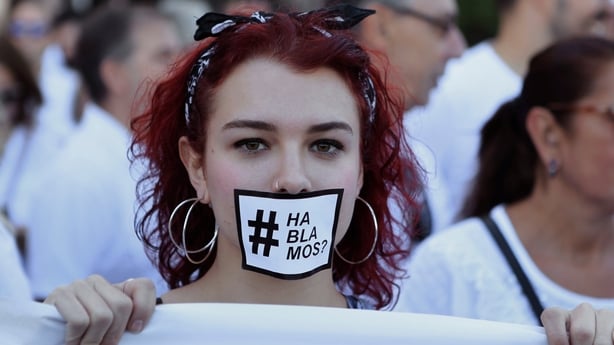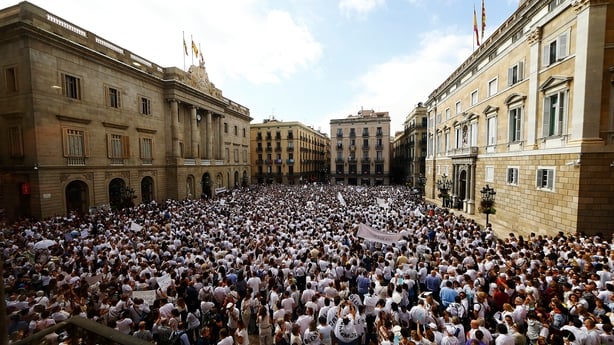Tens of thousands of people gathered in Madrid and Barcelona this afternoon as Catalonia prepares to declare independence, calling for talks to defuse Spain's worst political crisis for decades.
The wealthy northeastern region of Catalonia, with its own language and culture, has long claimed to be distinct from the rest of the country.
Last Sunday it held a referendum on leaving Spain, a vote the constitutional court had banned.
The Catalan authorities say that a majority of those who voted supported a split from Spain, something the central government says is illegal under the country's 1978 constitution.
The political stand-off has divided the country, pushed banks and companies to move their headquarters outside Catalonia and shaken market confidence in the Spanish economy, prompting calls from the European Commission for Catalan and Spanish leaders to find a political solution.


In peaceful protests called across 50 Spanish cities, and fully dispersed by this afternoon, thousands gathered dressed in white and carrying banners calling for peace and dialogue between leaders.
In Barcelona, protesters chanted "let's talk" in Catalan (above), while many carried signs criticising political leaders for not finding a diplomatic solution to the impasse.
Meanwhile, in Madrid, parallel to the "Let's talk" march, thousands gathered beneath the enormous Spanish flag in Colon Plaza waving their own flags, singing and chanting "Viva Espana" and "Viva Catalonia".
While Catalan leader Carles Puigdemont has said he is open to mediation, Prime Minister Mariano Rajoy insists the region gives up the independence push, which grew in strength during a near-six year economic crisis, before he will sit down to talk.
Mr Rajoy's government mobilised thousands of national police to stop the banned vote, physically intervening as would-be voters tried to cast ballots.
We need your consent to load this rte-player contentWe use rte-player to manage extra content that can set cookies on your device and collect data about your activity. Please review their details and accept them to load the content.Manage Preferences
The police violence drew widespread condemnation and forced the government to issue an apology yesterday, although tensions continued to rise after reports that plans for a unilateral declaration of independence will be handed to the Catalan parliament on Tuesday.
The crisis has also caused disquiet among Spain's European Union partners and German Chancellor Angela Merkel has discussed it with European Commission President Jean-Claude Juncker, an EU official told Reuters.
Concern is growing in EU capitals about the negative impact of the crisis on the Spanish economy, the fourth largest in the eurozone, and on possible spillovers to other economies.
European finance ministers, gathering in Brussels on Monday and Tuesday for a regular meeting, could discuss the issue, although it is not formally on the agenda, EU officials said.
The support given in public statements by EU leaders to Mr Rajoy is combined with concern expressed in private about how the Spanish government's use of police to prevent Catalans from voting last week in an independence referendum could backfire.
Some EU states are worried that talk of Catalan independence could fuel secessionist feelings in other parts of Europe.

